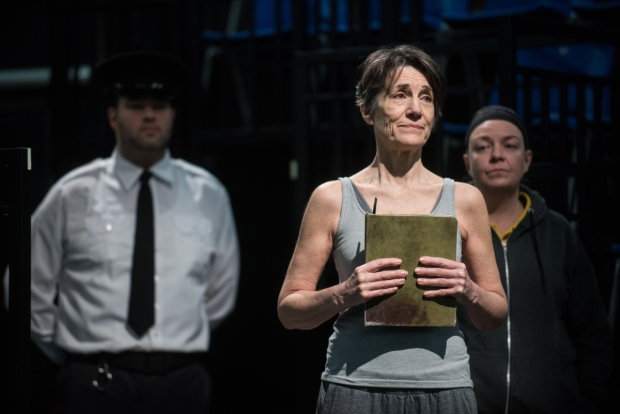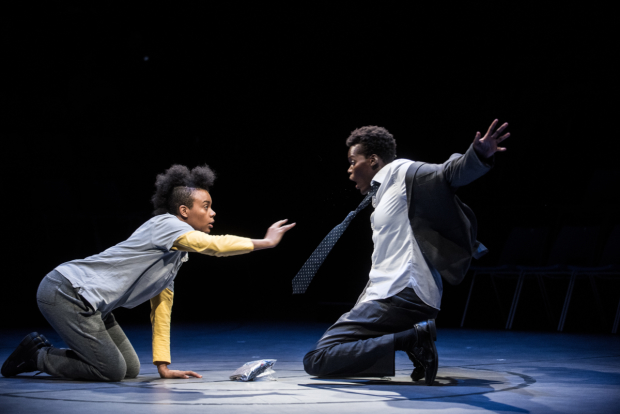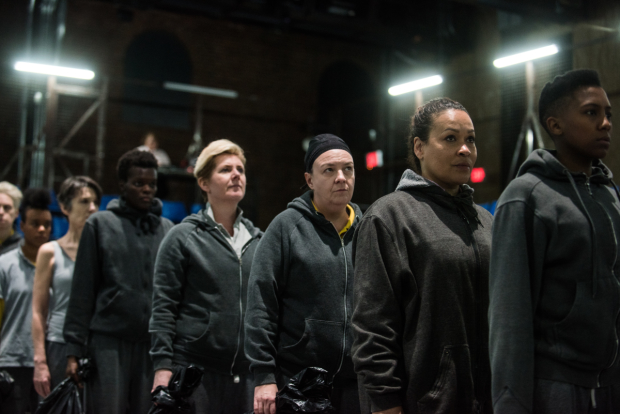The Tempest

(© Teddy Wolff)
To err is human; to forgive, divine. That is why a grand gesture of forgiveness comes with such an emotional rush at the end of William Shakespeare's The Tempest. In the case of director Phyllida Lloyd's Donmar Warehouse production, now playing in Brooklyn at St. Ann's Warehouse, it also has to do with the divine Harriet Walter, who plays Shakespeare's most godlike creation, Prospero, with uncommon depth of feeling.
As was the case with Lloyd's last two Shakespeare plays for Donmar (Julius Caesar and Henry IV), The Tempest is presented as a play wrapped within a play set in a women's prison. Gender lines blur as the all-female cast find themselves playing women who are, with the exception of Leah Harvey (who portrays Miranda), also playing men. Walter introduces herself not as Prospero, but as Hannah, a political prisoner serving 75 years to life (as noted in the program, Hannah is based on American radical Judith Clark). Since so much of the story revolves around Prospero's political exile to a remote island and his magical subjugation of the creatures therein, the motif works better here than in any of Lloyd's previous efforts, leading to the kind of seamless storytelling that one hopes for (but rarely gets) when Shakespeare is adapted to an unlikely time or place.

(© Teddy Wolff)
At the top of the play, the exiled Duke of Milan, Prospero (Walter), conjures a storm to bring his usurpers to the island of his banishment (in this production, a prison). Among them is Prospero's brother, Antonio (Carolina Valdés), and Alonso, the King of Naples (Martina Laird). Prospero plans to regain his dukedom by using his magic to cause Alonso's son, Ferdinand (Sheila Atim), to meet and fall in love with Prospero's daughter, Miranda (Leah Harvey). He enlists the help of his spritely servant, Ariel (Jade Anouka), whom he has pledged to free at the end of this mission (even though this is a promise Prospero has made and broken many times). Less eager to help is the island's other original resident, Caliban (Sophie Stanton), who sees Prospero as an invader and tyrant.
The hilarious Stanton provides much of the show's comic relief in her scenes with Jackie Clune and Karen Dunbar, who play Stefano (Alonso's tipsy butler) and Trinculo (his jester), respectively. But the laughs are grounded in real desperation for Stanton: Her Caliban hates the bookish Prospero so much that he views the clownish Stefano as a savior who will help him take back the land that is rightfully his, a contrivance that seems strangely realistic in 2017.
Lloyd makes a clear case that prison politics aren't far removed from those of the outside world: Costume designer Chloe Lamford adorns the scheming Italian nobles in fitted suits and slicked-back hair, suggesting either white-collar criminals or mobsters (a distinction without a difference). Meanwhile, the radiant Anouka plays Ariel as a charismatic dancehall singer — rather than teleporting to mesmerize her audience, she pops and locks.

(© Teddy Wolff)
Movement director Ann Yee has created a rich physical vocabulary for this world: Prospero has the power to pause time, leaving the characters idling in place like figures in a Nintendo game. The actors are so rigorous in their observance of this convention and Walter is so commanding in her performance that we begin to instinctively follow her arms around, as if compelled by magic.
Video designer Duncan McLean makes Prospero's magic a reality when images of middle-class consumption are projected on several large balloons as part of a wedding gift to Miranda and Ferdinand. Certainly, eating at McDonald's and shopping at H&M must seem like a fantastic luxury to the incarcerated. Even with all the garish logos flying around, the effect is positively beautiful under James Fancombe's enchanting lighting design. Of course, we are well aware that the spell could be lifted at any moment by a loud buzzer (jarring sound design by Pete Malkin) and the entrance of an even more abrasive prison guard (Liv Spencer, who steals every scene she's in with her effortless sass).

(© Teddy Wolff)
In this week of presidential pardons, The Tempest and its themes of clemency resonate, particularly in this astute adaptation. Prospero crashes his treacherous brother and coconspirators into the island not to exact revenge, but to reclaim his birthright and forgive those who tried to steal it away. As Walter struggles to say, "I do forgive thy rankest fault," we can physically sense how difficult it is for these words to pass through her lips. But the very weight of the task is what makes it so deeply satisfying. When Walter says, "Let your indulgence set me free," she's speaking not as Prospero, but as the still-incarcerated Hannah, who has seen generations come and go at her prison. Do we as a society have the courage to be as forgiving to her as Prospero was to those who did him harm?











